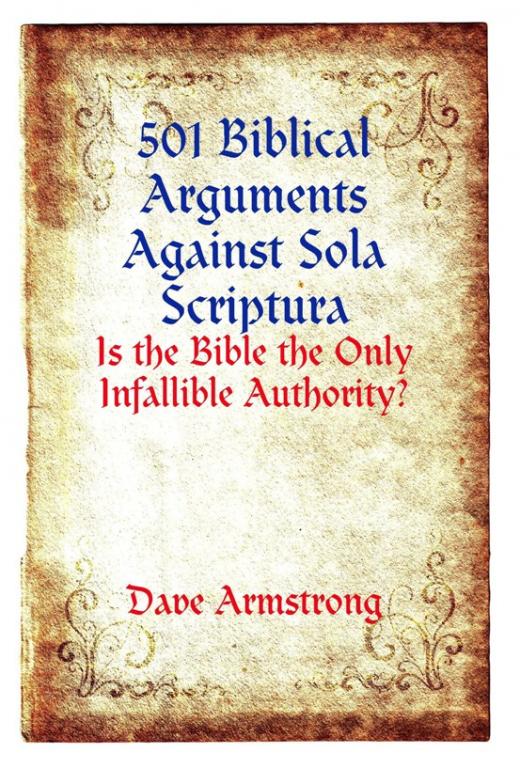
The following is from my discontinued 2009 book, 501 Biblical Arguments Against Sola Scriptura. It was condensed and reformulated into 100 Biblical Arguments Against Sola Scriptura (published by Catholic Answers in 2012; you can download for free my related 43-minute interview with Jimmy Akin). The original was set up in terms of “pensees” (brief thoughts, a la Blaise Pascal) collected, from the shortest to the longest within each chapter. This chapter ran 5 1/2 pages and presented 23 separate arguments.
Abbreviations for other books of mine from which material is drawn:
BCO = Bible Conversations (2002)
MBE = More Biblical Evidence for Catholicism (2002)
PRO = Protestantism: Critical Reflections of an Ecumenical Catholic (2003)
***
304. No one is denying the authority of Scripture, only that it exists in isolation, apart from Church and Tradition. [BCO, 15]
305. All who accept sola Scriptura believe in material sufficiency, but not vice versa. That’s the fallacy often present in these sorts of discussions.
306. Protestants often presuppose that sola Scriptura is essential to exegesis or desire to biblically support any doctrine, when it is not at all.
307. Biblical statements about material sufficiency and inspiration of Scripture don’t prove either sola Scriptura or the formal sufficiency of Scripture.
308. If Catholics affirm the material sufficiency of Scripture, then it cannot be the case that “material sufficiency” is essentially a synonym for sola Scriptura.
309. Our common ground is the centrality and inspiration of Holy Scripture and reverence for the Nicene Creed. The debate is over whether it is the sole rule of faith and exclusive authority. [BCO, 19; modified]
310. The Catholic Church, insofar as it is an “official” interpreter of Scripture, claims to be merely authoritatively discovering the correct meaning, not in any sense determining or creating what is already there.
311. All true Christian doctrines are either explicitly stated in the Bible, or able to be deduced from solid biblical evidences (i.e., I accept the material sufficiency of Scripture). In my opinion, sola Scriptura falls under neither category. [BCO, 12]
312. Scripture and Tradition are woven together, of a piece. The Church authoritatively interprets Scripture, but in so doing does not introduce anything that was not inherent in Scripture (explicitly or implicitly) in the first place. [BCO, 44; modified]
313. When a Catholic (for example, St. Athanasius) appeals to Scripture to back up his argument, it does not reduce to sola Scriptura. I appeal to the Bible constantly in my own apologetics, yet I deny sola Scriptura, as this book amply proves!
314. Even an inspired document needs to be authoritatively interpreted and its teachings proclaimed and codified and systematized in their particulars and parameters in creeds and confessions (just as in Protestantism, pertaining to the latter aspects). [BCO, 49]
315. If a person had a Bible on a deserted island, and knew not the slightest thing about Christianity, the Church or Christian history, then surely they could attain eschatological salvation by means of the Bible alone. But that is not the usual situation we find ourselves in. [MBE, 105]
316. I’m not against Bible memorization altogether, or indeed any kind of memorization, but only its insufficiency if it is done by “rote” without awareness of the larger principles embodied by the things memorized, or for mere “prooftexting” purposes, without sufficient background knowledge or awareness of systematic theology and the dogmas of the Church.
317. Catholics believe in the material sufficiency of Scripture for salvation. The Gospel contained in the Bible (which we agree on) is sufficient for salvation. At the same time, the Church is also necessary for salvation whether or not one recognizes that fact or not, just as Christ is necessary, whether the person who has never heard of Him is aware of that or not. [PRO, 10]
318. Materially sufficiency is the belief that all Christian doctrines can be found in Holy Scripture, either explicitly or implicitly, or deducible from the explicit testimony of Holy Scripture (Catholics fully agree with that). It does not mean that Scripture is the “only” source of doctrine (in a sense which excludes tradition and the Church). That is what formal sufficiency means.
319. I believe in the material sufficiency of Scripture myself, and this is an acceptable Catholic position. I deny that Scripture is formally sufficient as an authority over against apostolic succession, biblically consistent and biblically based Tradition, and the Church (however the latter is defined). I deny that Scripture itself teaches either formal sufficiency or sola Scriptura. [BCO, 21]
320. Material sufficiency of Scripture is the view that all Christian doctrines can be found in Scripture, explicitly or implicitly; fully developed or in kernel form. Catholics hold to this. Formal sufficiency of Scripture is the adoption of the principle of sola Scriptura as the Rule of Faith. Catholics deny that, and I say that the Fathers (being Catholics from an earlier, less theologically and ecclesiologically developed period) do as well.
321. Binding Church authority is a practical necessity, given the propensity of men to pervert the true apostolic Tradition as taught in Scripture, whether it is perspicuous or not. The fact remains that diverse interpretations arise, and a final authority outside of Scripture itself is needed in order to resolve those controversies. This does not imply in the least that Scripture itself (rightly understood) is not sufficient to overcome the errors. It is only formally insufficient by itself.
322. It is no novel thing for a Catholic (or someone who has a view similar to Catholics regarding the Rule of Faith) to compare Scripture with Scripture. I write entire books and dozens of papers where I consult Scripture Alone to make my arguments (precisely because I am arguing with Protestants and they don’t care what Catholic authorities state on a subject). It doesn’t follow that I have therefore adopted the Protestant Rule of Faith. This is extraordinarily weak argumentation (insofar as it can be called that at all).
323. I write entire books and huge papers citing nothing but Scripture. It doesn’t mean for a second that I don’t respect the binding authority of the Catholic Church or espouse sola Scriptura. St. Athanasius made some extensive biblical arguments. Great. Making such arguments, doing exegesis, extolling the Bible, reading the Bible, discussing it, praising it, etc., etc., etc., are all well and good (and Catholics agree wholeheartedly); none of these things, however, reduce to or logically necessitate adoption of sola Scriptura as a formal principle, hard as that is for some people to grasp.
324. If a man was stranded on a desert isle with no one around, and a Bible, I believe he could be saved. I also believe he could be saved without a Bible or ever hearing a word of it, if he sought truth; since God said His existence is evident from that which is made (Romans 1). This does not disprove the need for a Church and an authoritative Tradition in normal circumstances. It’s like saying “I could survive on a deserted, barren island with bread and water, no modern conveniences, and no medicine.” Sure; but is this the best way to go through life? Do we not take advantage of those blessings that God has provided for us — among which is the Church, with its wise spiritual guides who help us better follow the path of discipleship? [BCO, 51; modified]
325. Being “scriptural” and being in accordance with sola Scriptura are not one and the same. This is a clever sleight of hand often employed by Protestant apologists (akin to the fish not knowing that it is in water: to the Protestant, sola Scriptura is the water he lives in or the air he breathes; thus taken absolutely for granted), but it is a basic fallacy, according to Protestants’ own given definition of sola Scriptura, which is, broadly speaking, as follows:
Sola Scriptura: the belief that Scripture is the only final, infallible authority in matters of Christian doctrine.
For something to be “scriptural” or “biblical” on the other hand, is to be in accord with the following qualifications:
“Biblical” / “scriptural”: supported by Scripture directly or implicitly or by deduction from explicit or implicit biblical teaching; secondarily: not contradicting biblical teaching.
As we can see, the two things are quite different. This is how and why a Catholic can be entirely committed to explaining and defending Catholic doctrine from Holy Scripture (indeed, it is my apologetic specialty and the focus of most of my published books), while not adhering to sola Scriptura in the slightest. Protestants don’t have a monopoly on Scripture; nor is sola Scriptura necessary to thoroughly ground doctrines in Scripture. The Protestant merely assumes this (usually without argument) and goes on his merry way.
326. Catholics believe in the material (but not formal) sufficiency of Scripture, but this must be understood in conjunction with development of doctrine. All Catholic doctrines can be found in Scripture, either explicitly, implicitly, or by deduction from other explicit teachings. But they will not all be in finally developed form. They will often be present in kernel form, or as seeds. Furthermore, no Catholic teaching contradicts the Bible, which is different from the concept of it being explicitly present in the Bible. For example, does the doctrine of the bodily Assumption of Mary into heaven contradict the Bible? No, not at all. In biblical thinking, such an event is entirely possible, and in fact, there are analogies such as Enoch, Elijah being taken up to heaven in a chariot of fire, and Paul claiming he may have gone up to heaven bodily (as well as the belief of dispensational Protestants in a Rapture where bodies will fly up to meet Jesus in the air and go to heaven). So, Mary’s Assumption is quite plausible, in the limited sense of being judged in terms of similar events in the Bible (I am not asserting that this is an airtight “proof” of it). A contradiction of the Bible, on the other hand, would be something like, “God has four Persons,” or “Jesus was not conceived as a result of Mary being overshadowed by the Holy Spirit, but by natural sexual relations” (which would contradict the Virgin Birth). So in this sense, we say that the Assumption is a biblical concept, not in the sense that it has an explicit biblical proof. But then again, of course sola Scriptura has no explicit biblical proof (or even an implicit one, I contend), thus making Protestant appeals to the principle hopelessly incoherent and self-defeating.
***
Photo credit: book cover designed by myself, using the Lulu publishing process, in 2009. The background was a photograph by Andrew C. of Bucharest, Romania.
***













